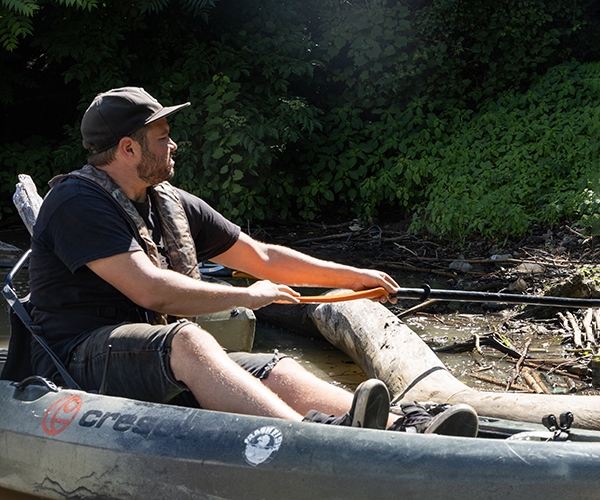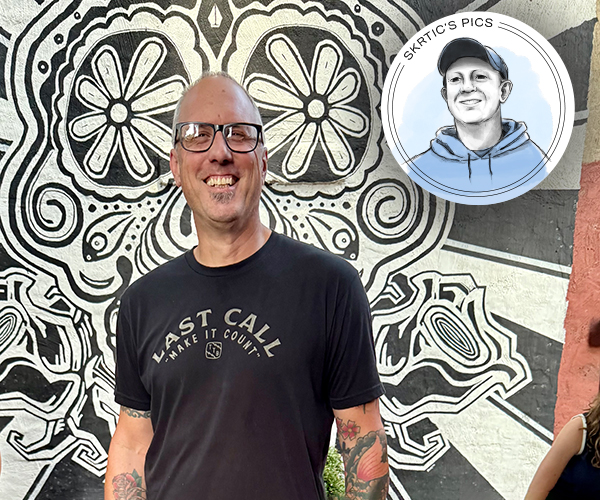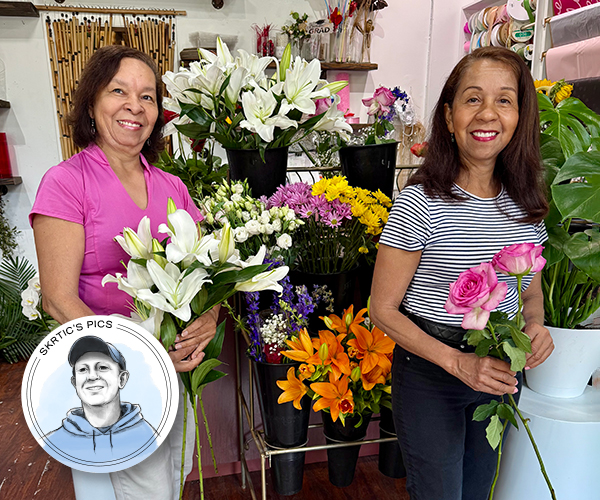In the gospel according to Maurice Small, food is more than nourishment. It is more than sustenance.
“Food is not something that you eat to get by,” Small says, resting his 6-foot-plus frame in a chair at the Cleveland Food Co-Op where he spreads his message. “Food is life.”
And Small’s life is all about food. But he’s not a gourmand. He’s a missionary dedicated to bringing good, wholesome food into the lives of everyone he meets.
Instead of fruits and vegetables, though, he hands out seeds and seedlings. His plan starts with layers of compost and shredded newspaper resting on a foundation of cardboard. He helped volunteers build one on the lawn of Huron Hospital last May, and by the end of summer, that “asphalt garden” was overflowing with cabbage, tomatoes, eggplants and herbs.
It’s just one innovative technique that Small teaches to anyone who is willing to learn. He starts with large sheets of cardboard laid on top of a parking lot, roof or any other hard surface. The next step is layering: shredded newspaper alternates with compost and, finally, soil for the plants. Call it agricultural lasagna.
It is an approach to farming that isn’t hindered by lack of space or contaminated soil. Small and others like him say asphalt gardens are a salvation for residents in poor neighborhoods that have been abandoned by major grocers.
“Over the course of 40 to 50 years, neighborhoods have developed, and flight has occurred in these neighborhoods. And with that flight, you leave behind something or someone,” he says. “Oftentimes the someone is whole communities that don’t have access to things that sustain their lives.”
Those “things” very often include access to fresh foods. So Small exhorts young people to turn away from cheap burgers and fries. He wants them to put their hands in the dirt to plant, grow and take pride in the result. If he can reach them, Small says, he believes more will follow.
“Working with young people gets the message home to parents,” he explains. “Getting that home to the parents gets it home to the community. Getting [the message] home to the community gets it home to the environment. Truly, the environment wins by having educated people living in it.”
Small leads by action as well as words. One of his current day jobs is delivering and selling produce from area farms to local urbanites. He’s up by 5:30 a.m., heading out to visit farmers in Lorain and Cuyahoga counties. By midmorning, he’s driving toward Cleveland, where he sells his wares.
Small also teaches cooking to elementary school students and entrepreneurship to young people by helping them create market gardens in which they can grow produce to sell.
“Maurice is reinvolving people in their own food system,” says Brad Masi, founder of the New Agrarian Center in Oberlin, a nonprofit organization that promotes sustainable agriculture.
He views Small as a contemporary Johnny Appleseed, and it’s easy to see why. With his long, mixed dreadlocks, sturdy clothes and energetic gait, Small seems like a modern version of the legendary nursery man. And, like Appleseed, Small is leading folks toward self-sufficiency one plant at a time.
That devotion to the Earth has taken Small a long way from his urban roots. Growing up at the Lakeview Terrace housing project at West 28th Street and Detroit Avenue, he learned gardening from his father, who died when Small was 8 years old. After his father’s death, Small abandoned gardening until the birth of his own son.
“When he was born, the memory clicked in,” Small recalls. “I wanted to teach my son what my father had taught me.”
Now he’s taking that message to entire communities. After spending much of his life in Cleveland, he now lives in Elyria, where he believes he can break new ground in promoting the availability of fresh foods.
“[If] you’re a single mother without a vehicle, and your friends are away, and you have two cans of soup and some microwaveable chicken McNuggets, what do you do?” Small asks, outlining the obstacles that often separate poor families who live in urban areas from fresh foods. “Access is critical.”
“Food is not something that you eat to get by,” Small says, resting his 6-foot-plus frame in a chair at the Cleveland Food Co-Op where he spreads his message. “Food is life.”
And Small’s life is all about food. But he’s not a gourmand. He’s a missionary dedicated to bringing good, wholesome food into the lives of everyone he meets.
Instead of fruits and vegetables, though, he hands out seeds and seedlings. His plan starts with layers of compost and shredded newspaper resting on a foundation of cardboard. He helped volunteers build one on the lawn of Huron Hospital last May, and by the end of summer, that “asphalt garden” was overflowing with cabbage, tomatoes, eggplants and herbs.
It’s just one innovative technique that Small teaches to anyone who is willing to learn. He starts with large sheets of cardboard laid on top of a parking lot, roof or any other hard surface. The next step is layering: shredded newspaper alternates with compost and, finally, soil for the plants. Call it agricultural lasagna.
It is an approach to farming that isn’t hindered by lack of space or contaminated soil. Small and others like him say asphalt gardens are a salvation for residents in poor neighborhoods that have been abandoned by major grocers.
“Over the course of 40 to 50 years, neighborhoods have developed, and flight has occurred in these neighborhoods. And with that flight, you leave behind something or someone,” he says. “Oftentimes the someone is whole communities that don’t have access to things that sustain their lives.”
Those “things” very often include access to fresh foods. So Small exhorts young people to turn away from cheap burgers and fries. He wants them to put their hands in the dirt to plant, grow and take pride in the result. If he can reach them, Small says, he believes more will follow.
“Working with young people gets the message home to parents,” he explains. “Getting that home to the parents gets it home to the community. Getting [the message] home to the community gets it home to the environment. Truly, the environment wins by having educated people living in it.”
Small leads by action as well as words. One of his current day jobs is delivering and selling produce from area farms to local urbanites. He’s up by 5:30 a.m., heading out to visit farmers in Lorain and Cuyahoga counties. By midmorning, he’s driving toward Cleveland, where he sells his wares.
Small also teaches cooking to elementary school students and entrepreneurship to young people by helping them create market gardens in which they can grow produce to sell.
“Maurice is reinvolving people in their own food system,” says Brad Masi, founder of the New Agrarian Center in Oberlin, a nonprofit organization that promotes sustainable agriculture.
He views Small as a contemporary Johnny Appleseed, and it’s easy to see why. With his long, mixed dreadlocks, sturdy clothes and energetic gait, Small seems like a modern version of the legendary nursery man. And, like Appleseed, Small is leading folks toward self-sufficiency one plant at a time.
That devotion to the Earth has taken Small a long way from his urban roots. Growing up at the Lakeview Terrace housing project at West 28th Street and Detroit Avenue, he learned gardening from his father, who died when Small was 8 years old. After his father’s death, Small abandoned gardening until the birth of his own son.
“When he was born, the memory clicked in,” Small recalls. “I wanted to teach my son what my father had taught me.”
Now he’s taking that message to entire communities. After spending much of his life in Cleveland, he now lives in Elyria, where he believes he can break new ground in promoting the availability of fresh foods.
“[If] you’re a single mother without a vehicle, and your friends are away, and you have two cans of soup and some microwaveable chicken McNuggets, what do you do?” Small asks, outlining the obstacles that often separate poor families who live in urban areas from fresh foods. “Access is critical.”



